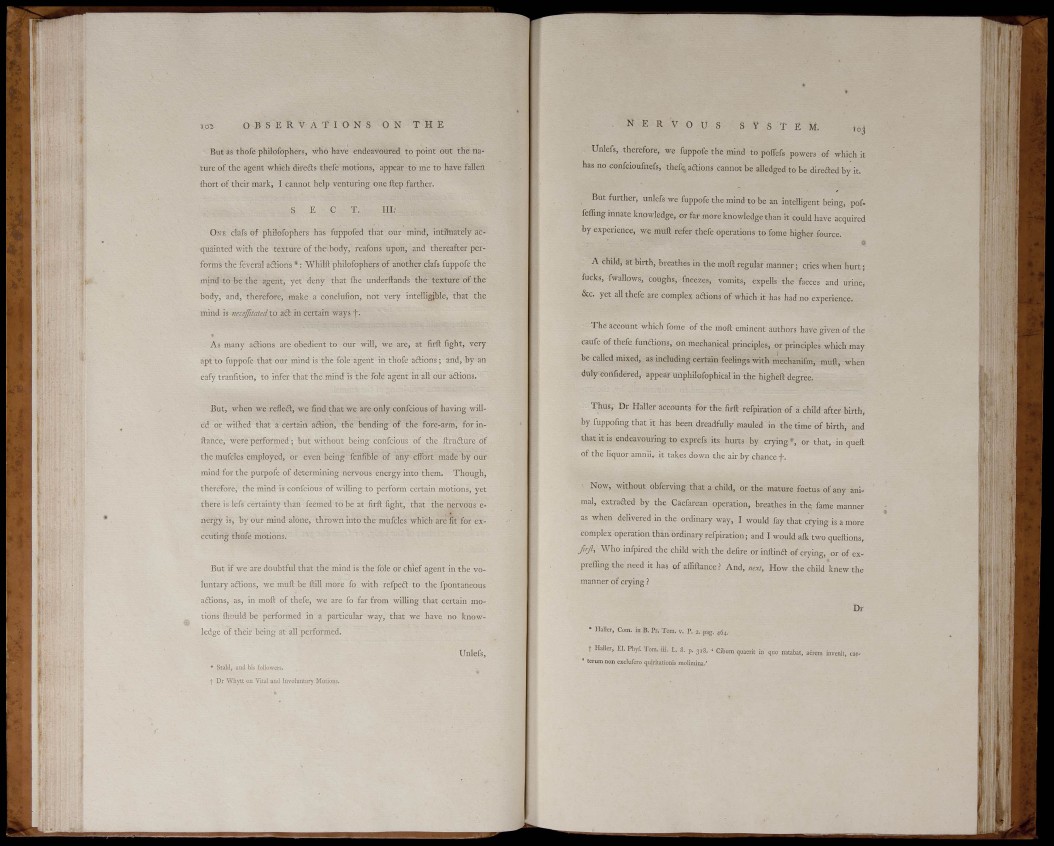
' T i : ,
. i r : . ; ; : ; ^ ' :
F I - : ? !
N S 1
io:i OBSERVATIONS ON THE
But as thofe philofophers, who have endeavoured to point out the nature
of the agent which direils thefc motions, appear to me to have fallen
ihort of their mark, I cannot help venturing one ftep faithcr.
ONE clafs of philofophers has fuppofed that our mind, intiinatcly acquainted
with the texture of the body, reafons upon, and thereafter performs
the feveral actions *: Whilft philofophers of another clafs fuppofc the
mind to be the agent, yet deny that ilie underftands the- texture of the
body, and, therefore, make a conciufion, not very intelligible, that the
mind is necejfuated to ad in certain ways f .
As many aiflions are obedient to our will, we are, at firil fight, very
apt to fuppofe that our mind is the fole agent in thofe aitions; and, by an
cafy tranfition, to infer that the mind is the folc agent in all our aftions.
But, when we refleit, we find that we are only confcious of having willed
or wiflied that a certain adlion, the bending of the fore-arm, for inftance,
were performed; but without being confcious of the ftrudlure of
the mufcles employed, or even being fenfible of any effort made by our
mind for the purpofe of determining nervous energy into them. Though,
therefore, the mind is confcious of willing to pcrfoi'm certain motions, yet
there is Icfs certainty than feemed to be at firft fight, that the nervous energy
is, by our mind alone, thrown into the mufcles which are fit for executing
thofe motions.
But if we are doubtful that the mind is the fole or chief agent in the voluntaiy
aftions, we muft be flill jnore fo with refpedl to the fpontaneous
aftions, as, in moft of thefe, we are fo far from willing that certain motions
Ihould be performed in a particular way, that we have no knowledge
of their being at all performed.
Unlefs,
• Stalil, and iiis followers.
Dr Whytt on Vital and In\'oluntary Motions.
N e r v o u s s y s t e m . t c 3
Unlefs, therefore, we fuppofe the mind to poifefs powers of which it
has no confdoufnefs, thefe, adions cannot be alledged to be dircfted by it.
But further, unlefs we fuppofe the mind to be an intelligem being, poffeffing
innate knowledge, or far more knowledge than it could have acquired
by experience, we muft refer thefe operations to fome higher fource.
A child, at birth, breathes in the moft regular manner; cries when hurt;
fucks, fwallows, coughs, fneezes, vomits, expelis the faeces and urine,
&c. yet all thefe are complex aflions of which it has had no experience.
The account which fome of the moft eminent authors have given of the
caufe of thefe funclions, on mechanical principles, or principles which may
be called mixed, as including certain feelings with mechanifm, muft, when
duly confidered, appear unphilofophical in the higheft degree.
Thus, Dr Haller accounts for the firft refpiration of a child after birth,
by fiippofnigthat it has been dreadfully mauled in the time of birth, and
that it is endeavouring to exprefs its hurts by crying*, or that, in qucft
of the liquor amnii, it takes down the air by chance f .
Now, without obfcrving that a child, or the mature foetus of any animal,
extraaed by the Caefarean operation, breathes in the fame manner
as when delivered in the ordinary way, I would fay that crying is a more
complex operation than ordinary refpiration; and I would alk two queftions,
JirJI, Who infpired the child with the defire or inftinft of crying, or of expreffingthe
need it has of afliftance? And, m^t. How the child knew the
manner of crying ?
Dr
' Haller, Com. in B. Pr. Tom. v. P. 2. p !• 4«+
t H.ller, EI. Phyf, Tom. ¡¡i. L. 8. p. 3,8. • Cibum ,uaer,. m mfba., a
' terum non exclufcro qiuntationis molimina.'
1 invenit, c